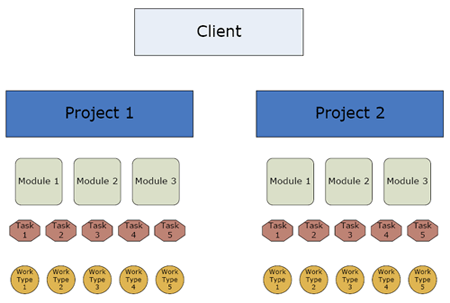Please head to help.myintervals.com for help articles and guides. If you have any questions, please contact our support team.
-
- baronnoraz
- Nov 17th 2008
I'm new to Intervals and trying to figure out how best to conform to its structure to get the most out of it.
I have a large client that has several internal departments, Accounting, Sales and Marketing, etc. They want to be able to know how much time we spend working on projects for each individual department. Conceptually, I think of this as...
Client | Department | Project | Module | Work Task
Of course Intervals doesn't have (appears to not have) the "Department" concept. My initial thought was to either roll up the department information into the Client and lose the ability to report across all of the client's projects or push down the department into the Project, effectively making Modules projects...
Client 1 [Accounting] | Project... | Module... | Work Task...
Client 1 [Sales and Marketing] | Project... | Module... | Work Task...
or
Client 1 | [Accounting] | Project/Module... | Work Task...
Client 1 | [Sales and Marketing] | Project/Module... | Work Task...
Maybe there are more sophisticated reporting mechanisms that I'm not aware of, but I was thinking that you could roll up totals by Client, Project, Module at the very least. Any info would be greatly appreciated. -
- mholtzman
- Nov 18th 2008
I am also new to intervals and trying to figure out if we can adopt this to fit our workflow needs. In reading your example above, what if you broke out the projects first.
The hierarchy would look something like:
Client -> Project -> Department -> Tasks
ClientA -> Project1 -> Sales ->Tasks
ClientA -> Project1 -> Accounting ->Tasks
ClientA -> Project1 -> Marketing ->Tasks
ClientA -> Project2 -> Sales ->Tasks
ClientA -> Project2 -> Accounting ->Tasks
ClientA -> Project2 -> Marketing ->Tasks -
- baronnoraz
- Nov 19th 2008
Thanks mholtzman. I'll see if that works for my reporting needs.
It's more the case that the Sales department would have Project1 and Project2 and the Accounting department would have Project3 and Project4, not that each department would have a particular piece of the same project. -
- Michael
- Nov 24th 2008
Depending on your reporting needs you may be able to make it work with modules with one module per department. This would keep everything under one project. I know some Intervals customers that do support for software do something similar where they setup a support project and put each client as the module. Your need sounds similar but with departments.
Also, here is a rough hi level view of the elements within Intervals:
A client can have multiple projects and the modules, tasks, and work types live within a project. The default modules and work types get pulled into a project and then you can choose whether or not to use them for that particular project.
Here are some other links that might be helpful:- Working with default work types and modules to show up in projects
- Default Modules & Work Types Video Support | the Default Modules & Work Types video on the right
- Project Templates
1 to 4 of 4
Comments are closed.
For more Intervals help documentation, please visit help.myintervals.com
